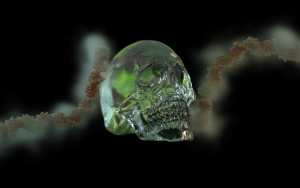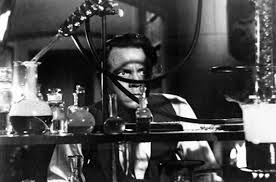Gordon Institute, Sydney; September 2011
Professor Kasper Kozakievicz – Professor K to colleagues because his name was almost impossible to pronounce – looked at the computer printout on his desk and smiled; the results were exactly as he had expected. A tremendous feeling of elation quickened his heartbeat, making his emaciated body tremble with excitement. Reaching for his chair to steady himself, he suddenly felt dizzy and weak. Stars began to dance in front of his eyes just before a bundle of sharp darts embedded in his brain. Moments later, his knees gave way and he collapsed to the floor.
Professor K had known for months he was dying. The cancer – a particularly aggressive one – had spread rapidly with relentless predictability. To an eminent research scientist, the prognosis was obvious: death was only a matter of time. Rather than subjecting himself to unpleasant and debilitating treatment to buy a few more feeble days, he had thrown himself deeper into his research, much to the dismay of his exasperated family, friends and colleagues. Only those who knew him well understood what he was doing, and why.
Ironically, the day he diagnosed his own cancer was the very day an unexpected breakthrough occurred in his research. From that day on, he knew he was getting close; very close. All he needed was a little more time – but time was running out.
Professor K opened his eyes. Darkness. He tried to move his fingers, but they wouldn’t obey. Then slowly, a wave of excruciating pain reached his tortured brain as he regained consciousness and the darkness receded. Professor K knew exactly what was happening: death was standing at the door! Mustering the last of his remaining strength, he got unsteadily to his feet and fell into his chair. My notes, he thought, where are my notes? Trying not to panic, he searched his cluttered desktop for his research notes with shaking hands. Finding the little notebook under a pile of papers, he relaxed as a hint of a smile creased his wan face. Then, taking a deep breath, he reached for his pen and began to write like a man possessed.
On the other side of the globe, Dr Alexandra Delacroix was fast asleep in her Marseilles apartment, located next to the Université De La Méditerranée School of Medicine where she worked, when her mobile rang. She wasn’t used to getting phone calls in the middle of the night, and sensed it must be something important. Instantly awake, she reached for the phone on her bedside table, peered at the incoming number and pressed answer. ‘Do you know what time it is, Kasper?’ she said sleepily.
‘I do, Lexi,’ replied the professor calmly. ‘Please listen carefully, there isn’t much time. I’m talking to you as a man who is about to die, but more importantly, I’m talking to you as a fellow scientist.’
Silence. Dr Delacroix had known about her mentor’s illness for some time, but was unaware how far it had progressed. ‘How bad is it?’ she asked.
‘I won’t see tomorrow …’
‘Go on.’
‘I would like you to be my successor, so to speak.’
‘What do you mean?’
‘I think I’ve found a breakthrough in cancer diagnosis and treatment.’
Again, silence. Then, ‘Across the board?’
‘Quite possibly. It’s groundbreaking.’
‘Are you serious?’
‘Absolutely!’
‘My God, Kasper, do you realise what you are saying?’
‘I do. There’s still a long way to go with all the trials and such, but the proof is right here in front of me. But only you will understand my crazy notes and abbreviations, and how it all works.’
‘What about Cavendish; isn’t he next in line?’
‘Cavendish is a plodder. Too much ambition, not enough talent. He’s not in your league. This is far too important. I want you—’
‘Because we’ve worked together before, you mean?’ interrupted Dr Delacroix.
‘Yes, and because of who you are,’ said the professor, sounding weak.
‘Speak up, Kasper, I can barely hear you,’ said Dr Delacroix, raising her voice. For a while, all she could hear was heavy breathing on the other end of the line.
‘I can’t see any more,’ said the professor, gasping for breath.
‘Stay with me, Kasper!’ shrieked Dr Delacroix. ‘What do you want me to do?’
‘It’s all in my notes and the specimens. I’ve put everything into the safe here in the lab. This is the combination. Write it down: 12 … 48 … 62. Got that?’
‘12, 48, 62,’ repeated Dr Delacroix.
‘Good,’ sighed the professor, suddenly calmer. ‘Will you be my intellectual heir, so to speak?’
‘Yes.’
‘Carry the torch; promise?’ whispered the professor.
‘I promise.’
‘As my friend?’
‘Yes.’
‘Then you must hurry! A position is waiting for you here at the Gordon. It’s all arranged.’
‘And Cavendish?’ Dr Delacroix asked again.
‘Don’t worry about him!’
Her mind racing, Dr Delacroix considered the implications. She would have to give up her position at the Institute for Structural Biology and Microbiology at the University and move to Sydney. The professor’s offer was the opportunity of a lifetime. Cavendish could be a problem, but there was really nothing to consider. ‘Can’t you get some help?’ she asked, concerned about her dying friend.
‘It’s Sunday morning; there’s no one here. And besides,’ whispered the professor, ‘it’s too late for that now. At least it hasn’t been in vain …’
‘What did you say?’ shouted Dr Delacroix, her eyes misting over. There was no reply; all she could hear was silence.





